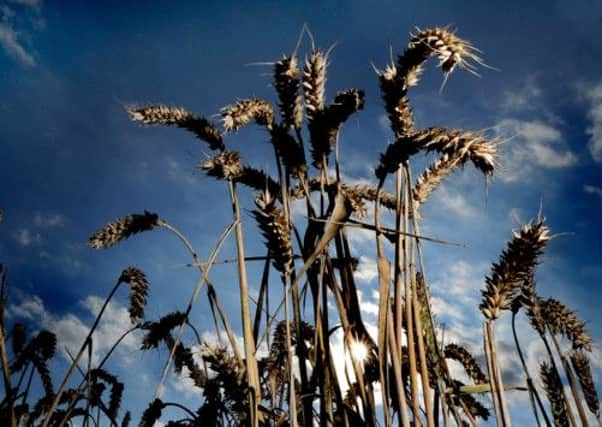Innovation is the key to improved harvests


Overall, the quality of the summer’s harvest is expected to be high thanks to the settled period of good weather over recent months. What has held yields back however is the total area dedicated to sowing wheat was lower than normal.
Torrid weather conditions last year and at the start of 2013 made for tricky drilling conditions, and it limited how much land was given over to the crop.
Advertisement
Hide AdAdvertisement
Hide AdBrett Askew, the National Farmers’ Union’s regional crops board chairman, said most farmers in Yorkshire and the North East were experiencing lower yields than last year. As a result, he expects the UK to import higher than normal volumes of wheat for the second year running.
“Local farmers worked really hard to get this year’s crop up and running, but the wheat area planted was much reduced – by 19 per cent nationally,” Mr Askew said.
“So while our harvest is better than anticipated earlier in the year, it comes as no surprise that overall our wheat production will be significantly down, given that drilling conditions were so difficult.
“The situation is being made more challenging still given lower world prices, which are currently £50 a tonne down, and the fact that unusually most farmers have not sold a proportion of their crop in advance given the level of uncertainty over what the harvest would deliver.
Advertisement
Hide AdAdvertisement
Hide Ad“This means that over the coming months, most arable farmers in our region will still be facing difficulties in managing their cashflow.”
As a net importer of food the UK must start to produce more itself, the NFU says, so it is vital that there is a more vibrant agricultural research and knowledge exchange to find ways to better weather-proof crops in the future.
A new Agri-Tech strategy which commits £160m of investment to the research and development sector was announced by the Government in July, a sector the NFU contests has been long-neglected.
Mr Askew said: “A reverse in the decline of spend for agricultural R&D is crucial if we are to increase production and impact less on the environment in years to come, particularly if extreme weather events become more frequent.
Advertisement
Hide AdAdvertisement
Hide Ad“Innovation and tech-nology are vital in keeping crops healthy and resilient, yet this technology has been under a sustained and unwarranted attack recently, and the impacts could be grave for the industry.
“The last thing we want is for legislators to regulate the UK and EU out of arable production by undermining access to pesticides and products that will be vital to protect the crops of the future.”
The improved weather conditions over the summer did at least bode well for next year’s crop, Mr Askew said.
“The real bonus at the moment is that conditions are very much better for getting next year’s crop in the ground and of course farmers know this industry is a long game. I think we are all relieved to draw a line under this season.”
Wheat by numbers
Advertisement
Hide AdAdvertisement
Hide AdThe National Farmers’ Union’s 2013 Harvest Survey was published this week and revealed that the overall national wheat yield is up 16 per cent on 2012, at 7.8 tonnes per hectare.
Nonetheless, total wheat production in England looks set to be much lower than the 13 million tonnes produced last year.
Yields are up one per cent on the five-year average but the total cropped area is down by 17 per cent over the same period.
Defra releases UK-wide results on October 17.